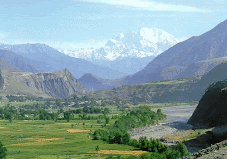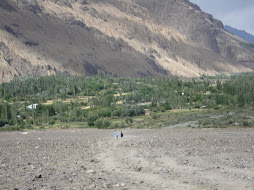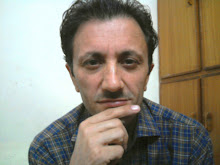ISLAMABAD: There is a dire need to spread the thoughts of Mawlana Jalaluddin Rumi in order to bring stability not only to the country but also to the whole world.
This was stated by speakers at a function held in connection with the birth anniversary of Mawalana Rumi under the aegis of Rumi Forum here on Wednesday.
Those who spoke on the occasion included Azerbaijan’s Ambassador Dr Eynullah Madatli, Adviser to the Prime Minister on Religious Affairs Allama Hamid Saeed Kazmi; Naveed Zafar, Talat Farooq from the Bahria University; Dr Naeem Mushtaq, Dr Seema Arif from the University of Central Punjab; Dr Ghazala Mehdi from Quaid-i-Azam University and Ahsan Akbar.
The speakers read their papers on the thoughts of Rumi and highlighted his teachings. They said intellectuals from any religion got benefits from his Mathnawi but those who understand Islam always gained spiritual blessings from it.
“Rumi is a symbol figure for worldwide love, tolerance and dialogue. The name of Rumi stands for love and ecstatic flight into the infinite. If there is any general idea underlying his poetry, it is the absolute love of Allah.”
His influence on thought, literature and all forms of aesthetic expression in the world of Islam cannot be overrated. He is one of the great spiritual masters and poetical geniuses of mankind and is the founder of the Mawlawi Sufi order, a leading Sufi brotherhood of Islam.”
Rumi was born in Balkh on September 30, 1207, to a family of learned theologians. Escaping the Mongol invasion and destruction, Rumi and his family travelled extensively in the Muslim world, performed pilgrimage at Mecca and finally settled in Konya, Anatolia, which was part of the Seljuk rule.
When his father Sultanul Ulema Bahauddin Walad passed away, Rumi succeeded him in 1231 as professor of religious sciences. The 24-year-old Rumi was by then an accomplished scholar in religious and positive sciences.
He was introduced into the Sufi path by a wandering dervish, Shamsuddin Tabriz. His love and his bereavement for the death of Shams found their expression in a surge of music, Sema and lyric poems called Divani Shamsi Tabrizi.
Human being in the Sema is part of the inspiration of Rumi as well as of Turkish custom, history, beliefs and culture. Sema consists of seven parts.
Rumi is the author of six-volume didactic epic work, the Mathnai called ecstatically as the holy book in Persian by Jami. It discourses “Fihi ma fihi” written to introduce his disciples into metaphysics.
Rumi form is established with the sublime mission to foster intercultural dialogue and to provide a platform for education and information exchange. The Forum takes its name from the 13th century Muslim scholar-luminary-Sufi poet whose reach embraced all humanity as personified by his message that was drawn from the very essence of Islam.--Dawn
Wednesday, October 22, 2008
Subscribe to:
Post Comments (Atom)
Awesome and rugged

Beauty of Chitral

Kishmanja, a beautiful village in Yarkhun valley
Lush green

DIZG: threatened by floods

The legendary village of Ayun in Chitral

On way to Bumburet
Dizg, Yarkhun

Blog Archive
-
▼
2008
(197)
-
▼
October
(50)
- Sit-in staged against delay in Sheshi power house ...
- Govt warned against price hike
- Postgraduate college still a pipe dream in Chitral
- Severe food crisis may hit Chitral
- SELF HELP: Life On The Wrong Side
- Chitral seminar calls for protection of women's ri...
- Education, developmet in Chitral
- Aga Khan's visit still not confirmed
- Chitral: the secrets of my peace!
- Brep: power house project hits snags
- CM okays uplift projects for Chitral
- Work on Yarkhun bridge begins
- NBF readers' club scheme coming to Chitral
- Met official killed in Chitral
- Eliminating women trafficking our collective respo...
- Face of man accused of women trafficking blackened...
- Drosh residents protest power outages
- Rumi’s thoughts can bring stability to world
- Aga Khan's visit to Chitral - Letter 2
- Aga Khan's visit to Chitral -Letter 1
- Lowari tunnel opening to be a gigantic step, says NHA
- Arrangements for Lowari festival reviewed
- Widow's allegations denied
- Proposed Lowari tunnel festival - Letter
- Multi-stakeholder forum - Letter
- Arrangements for Lowari tunnel festival discussed
- Aga Khan to visit Chitral in mid-November?
- Body on women's rights formed in Chitral
- US drones fly over Chitral?
- Five cases of violence against women in Chitral in...
- Bids for trophy hunting invited
- Over 3,000 Benazir income support cards distribute...
- Preparations to welcome Aga Khan in full swing in ...
- Anti-polio drive begins in Chitral
- NHA agrees to open Lowari tunnel in winter
- MNA justifies supporting PPP
- Timely completion of uplift projects ordered
- Impersonator arrested
- Opening of Lowari tunnel for light traffic demanded
- Shortage of technical staff mars uplift in Chitral
- Bajaur blockade to hurt Chitralis too
- Upper Chitral residents to pay bills locally
- Chitral colleges lack hostel facilities
- Over 75,000 children to be administered polio drops
- Trade corridor: paradigm shift we’ve been waiting ...
- Lowari tunnel will be opened this winter
- Woman commits suicide in awi
- Islamabad-Chitral flights still being mismanaged
- JI leader sees conspiracy to establish Ismaili state
- Most Chitralis unable to go home on Eid due to hig...
-
▼
October
(50)
About Me

- Zar Alam Khan Razakhel
- Village Dizg, Yarkhun valley, Chitral, Pakistan
- I blog at http://chitraltoday.net (ChitralToday) about Chitral, its people, culture, traditions and issues. I have been writing about Chitral since 2000. Chitral is a scenic valley in the extreme north-west of Pakistan.
No comments:
Post a Comment